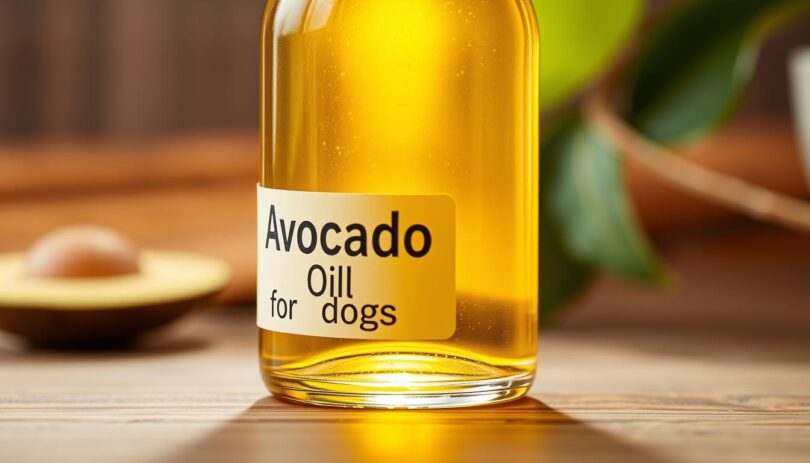Every pet owner knows that moment of hesitation: Is this food safe for my furry friend? Whether it’s a dropped snack or a new supplement, the question lingers. Avocado oil, praised for its health benefits in humans, sparks similar curiosity—and caution—for those caring for four-legged companions.
This guide explores whether avocado-derived products fit into a dog’s diet, focusing on nutritional science and veterinary insights. While the fruit’s flesh contains minimal persin (a toxin found in avocado pits and leaves), its oil lacks this compound entirely. Research from sources like the Merck Veterinary Manual confirms that moderate amounts may support skin, coat, and heart health due to vitamins and fatty acids.
However, high fat content demands careful portion control. Overconsumption can lead to weight gain or digestive issues like vomiting. Always consult a veterinarian before introducing new foods—especially for pets with sensitive stomachs or existing conditions.
Below, we’ll break down how avocado oil compares to whole avocados, safe serving sizes, and tips for incorporating it into meals. Knowledge empowers better choices, ensuring your pup stays happy and healthy.
Avocado Nutrition 101: Getting to Know the Fruit
Native to Central America, avocados have evolved from ancient superfoods to modern kitchen staples. Often nicknamed “alligator pears” for their bumpy skin, these fruits pack a nutritional punch. A single serving delivers vitamins B6, C, E, and folate, alongside monounsaturated fats that promote heart health.
Rich in fiber and antioxidants, the creamy flesh supports skin and coat vitality. However, other parts—like the pit, leaves, and skin—contain persin. This natural toxin can cause digestive issues in some animals, though the edible portion poses minimal risk when properly prepared.
At roughly 240 calories per fruit, moderation is key. Small amounts add flavor and nutrients to meals without overloading pets with fat. For those curious about safe avocado use for pets, understanding which parts to avoid matters most.
Modern diets celebrate avocados for their versatility and health perks. But their calorie density means even nutrient-rich foods require portion control. Later sections will explore how processed forms, like oil, compare to fresh options for animal companions.
Can Dogs Have Avocado Oil? Exploring Safety and Benefits
Modern food processing transforms natural ingredients into pet-safe solutions. Avocado oil undergoes meticulous extraction to eliminate risks while preserving nutritional value. This refined approach makes it distinct from raw fruit consumption.
Understanding Avocado Oil Extraction
Producers create avocado oil by pressing the fruit’s fleshy pulp. This method removes leaves, skin, and pits—parts containing persin. The result is a pure, toxin-free product rich in vitamin E and omega fatty acids.
Cold-pressed techniques retain antioxidants like oleic acid. These compounds support skin and coat health without digestive strain. Unlike whole avocados, the oil lacks fiber but offers concentrated benefits.
Comparing Avocado Oil to Whole Avocado
Whole avocados include edible flesh alongside hazardous elements. Choking risks from pits or intestinal blockages from skin make them less ideal. The oil skips these dangers while delivering key nutrients.
Fresh fruit provides fiber and vitamins but requires strict portion control. A teaspoon of oil offers similar fatty acids without excess calories. Always consult a vet to determine appropriate serving sizes for individual pets.
Health Benefits of Avocado Oil for Your Dog
Rich in nutrients, avocado oil offers specific advantages for canine wellness. Its omega-3 fatty acids support cardiovascular function by maintaining healthy cholesterol levels. Studies from the Journal of Animal Science note these fats may reduce inflammation linked to joint discomfort.
Vitamin E acts as a powerful antioxidant in avocado oil, protecting cells from oxidative stress. This nutrient also promotes skin hydration and a glossy coat. Research comparing plant-based oils found improved fur texture in animals receiving similar supplements.
Small doses added to meals can enhance skin elasticity and reduce dryness. Many owners report fewer itching episodes after introducing this oil gradually. It’s particularly useful for breeds prone to seasonal allergies or dermatitis.
Veterinary nutritionists often recommend avocado oil for its balanced fatty acid profile. Unlike some alternatives, it provides oleic acid without excessive calories. Always start with ¼ teaspoon per 20 pounds of body weight and monitor reactions.
While beneficial, moderation remains crucial. Consult your veterinarian to tailor portions based on activity levels and existing conditions. Pairing this supplement with a nutrient-dense diet maximizes results safely.
Potential Risks and Concerns with Avocado Products
Balancing nutrition and safety is key when introducing new foods to pets. While avocado oil carries fewer risks than raw fruit, whole avocados pose multiple hazards requiring awareness.
Persin, a natural fungicide, concentrates in avocado pits, leaves, and skin. Though minimal in flesh, accidental ingestion of these parts may trigger vomiting or diarrhea. Veterinary case reports describe instances where animals consumed fallen fruit from backyard trees, leading to gastrointestinal distress.
High fat content presents another concern. Excessive avocado oil or fatty flesh portions strain digestion, potentially causing pancreatitis. Breeds prone to weight gain or sensitive stomachs face higher risks. Even small quantities should be introduced gradually.
The avocado pit presents physical dangers. Its large size and smooth surface can lodge in the throat or intestines. Obstruction risks demand immediate veterinary intervention. Pet owners should always remove pits and skin before handling avocados nearby.
Moderation remains critical. While refined oil lacks persin, overfeeding any fatty supplement disrupts nutritional balance. Watch for lethargy, appetite changes, or unusual stool consistency after consumption. Contact your veterinarian promptly if these signs appear.
Understanding Persin and Its Effects on Dogs
Persin remains a key concern for pet owners exploring avocado-based products. This natural fungicide protects avocado trees from pests but poses risks when consumed in concentrated amounts. Found primarily in leaves, skin, and pits, its presence decreases significantly in the fruit’s edible flesh.
Dogs show greater resistance to persin compared to birds or livestock. However, large quantities of hazardous parts—like fallen leaves or discarded pits—may trigger mild reactions. Symptoms like stomach discomfort, vomiting, or loose stools typically resolve within 24 hours if exposure is limited.
Respiratory distress occurs rarely and usually only after extreme ingestion. Refined avocado oil bypasses these risks entirely since processing removes persin-rich components. This makes it safer than raw fruit when sourced responsibly.
Owners should discard avocado scraps securely and avoid planting trees in areas accessible to curious pets. While occasional flesh nibbles rarely cause harm, vigilance prevents accidental consumption of toxic parts. When introducing any new food, observe your companion closely for unusual behavior.
Knowledge about persin’s role helps balance safety with nutritional exploration. Always prioritize flesh-free products and consult your veterinarian if exposure to risky components occurs.
Safe Usage Guidelines for Avocado Oil in Your Dog’s Diet
Introducing new supplements requires careful planning to ensure safety and effectiveness. Follow these evidence-based steps to integrate avocado oil responsibly.
Step 1: Consult Your Veterinarian
Always discuss dietary changes with a professional. They’ll assess your companion’s weight, allergies, and existing conditions to determine suitability.
Step 2: Start Small
Begin with ¼ teaspoon for dogs under 20 pounds or ½ teaspoon for larger breeds. Mix it into meals twice weekly to observe tolerance.
Step 3: Monitor Closely
Watch for loose stools, lethargy, or appetite changes during the first month. These signs may indicate sensitivity to the oil’s high fat concentration.
Portion Control Matters
Experts suggest limiting intake to 1 teaspoon daily for dogs over 50 pounds. Smaller animals thrive with just a few drops per serving. Never exceed these amounts without veterinary approval.
Quality Over Quantity
Choose cold-pressed, 100% pure avocado oil. Avoid blends containing additives like salt or preservatives, which could trigger digestive upset.
Gradually increase portions every 2-3 weeks if no adverse reactions occur. Pair this supplement with regular exercise and balanced meals to maintain optimal weight. While persin-free, excessive amounts disrupt nutrient absorption—moderation remains non-negotiable.
Dog-Friendly Alternatives to Avocado and Avocado Oil
Pet parents seeking nutritious swaps for avocado-based products have plenty of options. Fresh fruits like apples (seedless), blueberries, and bananas deliver vitamins and fiber without risks. Crunchy vegetables such as carrot sticks or steamed green beans make low-calorie snacks packed with antioxidants.
Lean proteins offer safe alternatives to fatty supplements. Cooked turkey breast—free of seasoning or skin—provides high-quality protein for muscle maintenance. Pair these with omega-rich salmon oil, which supports joint mobility and a shiny coat more effectively than many plant-based oils.
Preparation matters. Always remove seeds, pits, or stems from fruits and veggies to prevent choking hazards. Lightly steaming vegetables improves digestibility while preserving nutrients. For oils, measure portions carefully: ½ teaspoon of salmon oil daily suits most medium-sized pets.
While these foods provide similar benefits to avocado oil, balance remains crucial. Treats should never exceed 10% of daily caloric intake. Consult your veterinarian to tailor choices to your companion’s age, weight, and health needs. With thoughtful selection, you can nourish your furry friend safely and deliciously.
Tips for Monitoring and Managing Your Dog’s Diet
Maintaining a balanced diet requires vigilance and adaptability. Observing your companion’s reactions to new foods helps prevent discomfort while ensuring nutritional needs stay met.
Recognizing Signs of Digestive Upset
Watch for vomiting, diarrhea, or sudden lethargy after dietary changes. Reduced appetite or excessive thirst may also signal sensitivity. Symptoms typically appear within 24-48 hours of trying new items.
Track reactions using a food diary. Note portion sizes, ingredients, and behavioral shifts. This helps identify patterns and adjust meals accordingly.
Guidelines for Appropriate Treat Portions
Treats should never exceed 10% of daily calories. For a 30-pound animal, limit extras to 50-70 calories daily. Measure oils or supplements carefully—½ teaspoon suits smaller breeds, while larger dogs handle 1 teaspoon.
Persistent symptoms like loose stools require veterinary consultation. Professionals can assess whether allergies or underlying conditions need addressing. Pair portion control with regular weigh-ins to maintain healthy body condition.
Wrapping Up Your Guide to Can Dogs Have Avocado Oil?
Navigating pet nutrition often feels like solving a puzzle with endless pieces. This guide has explored how refined avocado oil—when used thoughtfully—can complement a dog’s diet. Key takeaways include prioritizing toxin-free oil over raw fruit parts and adhering to strict portion guidelines.
Pure avocado oil offers vitamin-rich support for skin and coat health without persin risks. Start with tiny amounts, observe reactions, and consult a veterinarian to tailor plans. For hesitant owners, alternatives like salmon oil or fresh veggies provide similar nutritional perks.
Remember: every animal’s needs differ. What works for one pup might not suit another. Watch for subtle signs like energy shifts or appetite changes after introducing new supplements. Partnering with a vet ensures decisions align with your companion’s unique health profile.
Curious about others’ experiences? Share your stories or questions below! Informed choices stem from collective wisdom—and prioritizing moderation keeps tails wagging safely.
FAQ
Is avocado oil toxic to pets?
Pure avocado oil lacks significant persin levels, making it safer than raw fruit or pits. However, always consult a veterinarian before introducing new fats, especially for pets with pancreatitis or obesity.
What vitamins in avocado oil benefit a dog’s coat?
Cold-pressed avocado oil contains vitamin E and omega fatty acids, which support skin hydration and reduce inflammation. These nutrients promote a glossy coat when added sparingly to meals.
Can avocado oil cause stomach issues in dogs?
Excessive amounts may lead to vomiting, diarrhea, or pancreatitis due to high fat content. Start with ¼ teaspoon per 10 pounds of body weight and monitor for reactions.










Leave a Comment